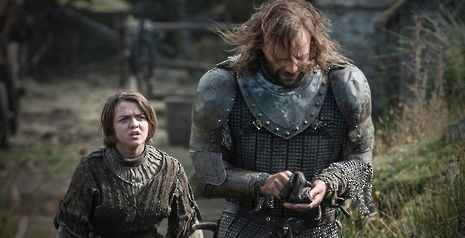TV: Game of Thrones fantasy for the masses
Alez Izza reminds us why we should all re-watch Game of Thrones in the waning days of May Week

“When you play the Game of Thrones you win or you die.” This quote from Cersei Lannister (Lena Headey) is steadily becoming one of the most iconic lines in TV history. Game of Thrones is so huge, piracy is irrelevant to its success. In a recent interview HBO programming director Michael Lombardo even went as far as to call the record levels of piracy “a compliment of sorts.” But why? Why has this fantasy world of dragon and giant ice walls enraptured a huge demographic, where other fantasies like Buffy the Vampire Slayer failed?
Firstly an introduction, especially if exam term has sheltered you from joining the ridiculous hype for season 4. Game of Thrones is a fantasy TV show based on the books by George RR Martin. Set primarily in Westeros, it follows the dynastic conflict, intrigue and brutal reality of a set of medieval-esque houses plying their way towards the Iron Throne. And it is brilliant.
One particular strength of the show is it speaks to human experience. It creates a world that, whilst wreathed in fantasy, feels hugely realistic. The violence may be mildly excessive at times, but that shows how Game of Thrones is willing to not shy away from portraying this world of knights and battles as it truly was: horrifically brutal. But for the historian in me (scientists feel free to move on) it is the show’s exploration of the theme of power which typifies the depth reached by HBO. In a chilling speech Littlefinger calls the “realm a lie” and proclaims that “chaos is a ladder”, stripping away the ‘fluff’ of the state to the basic fact of life as a mad rush for power.
But anyway enough humanities waffling. One particular liberating part of the show is its lack of reliance on huge acting icons. The few that are there provide brilliant performances; Sean Bean as the morally incorruptible Eddard Stark is at his rough Northern best. But it is the previously unknown stars that win you over. Maisie Williams is my pick of the younger actors, creating a thoroughly engaging transformation from rebellious youngster to mentally tortured warrior. Aiden Gillen is the class feature of the adults, providing deliciously evil deliveries of Littlefinger’s manipulation of the scramble for the Iron Throne.
Evil does not exist in Game of Thrones. Many TV shows push you to rout for the blond-wavy haired man in shining armour, and you know from the outset that he will win. And that is dull. Take Cersei Lannister. She is a manipulative women, tearing apart lives to get what she wants. But she is also a mother descending into post-traumatic disorder over Joffrey (her son’s) tyrannical abuses of power. This makes a TV show of tangible characters. Characters you invest in, characters you despise, characters you empathise, and characters that tear you apart when they meet their doom.
And it is this willingness to kill off even the main characters that really drives the popularity of the show. Why should we keep watching if all our favourites are dead I hear you ask? Because it is addictive. You keep watching each and every episode to see if it will happen. It is perverse fascination, and a breath of fresh air in a television industry built on tired plot stereotypes.
If you have stayed away from Game of Thrones so far, put off by tales of excessive violence or gratuitous nudity, then I urge you to reconsider: the series will have something for you. It is a medieval romance story, whether that is marriage or scandalous affairs. It is a dynastic politics piece, with betrayal almost as common as violence in the mad rush for the Iron Throne. It is a show about war, both the magnificent battle scenes and the terrible aftermath. And frankly, it will mean when a friend screams THE KING IN THE NORTH when they’re drunk, you’ll finally understand.
But of course feel free to ignore these heavily biased ramblings about a TV show. A friend once described me with 3 things: wine, Bolton Wanderers FC, and Game of Thrones. So this is hardly objective journalism.
 Interviews / ‘People just walk away’: the sense of exclusion felt by foundation year students19 April 2024
Interviews / ‘People just walk away’: the sense of exclusion felt by foundation year students19 April 2024 News / Copycat don caught again19 April 2024
News / Copycat don caught again19 April 2024 News / AMES Faculty accused of ‘toxicity’ as dropout and transfer rates remain high 19 April 2024
News / AMES Faculty accused of ‘toxicity’ as dropout and transfer rates remain high 19 April 2024 Theatre / The closest Cambridge comes to a Drama degree 19 April 2024
Theatre / The closest Cambridge comes to a Drama degree 19 April 2024 News / Acting vice-chancellor paid £234,000 for nine month stint19 April 2024
News / Acting vice-chancellor paid £234,000 for nine month stint19 April 2024




